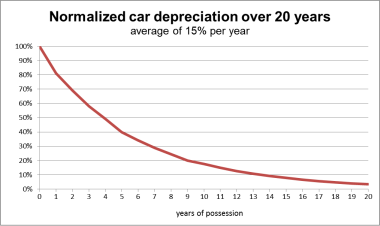
Back إهلاك Arabic অৱক্ষয় (একাউণ্টিং) Assamese Amortizasiya (mühasibat) Azerbaijani Амартызацыя Byelorussian Амортизация Bulgarian অবচয় Bengali/Bangla Depreciació Catalan Odpis Czech Afskrivning Danish Abschreibung German

In accountancy, depreciation is a term that refers to two aspects of the same concept: first, an actual reduction in the fair value of an asset, such as the decrease in value of factory equipment each year as it is used and wears, and second, the allocation in accounting statements of the original cost of the assets to periods in which the assets are used (depreciation with the matching principle).[1]
Depreciation is thus the decrease in the value of assets and the method used to reallocate, or "write down" the cost of a tangible asset (such as equipment) over its useful life span. Businesses depreciate long-term assets for both accounting and tax purposes. The decrease in value of the asset affects the balance sheet of a business or entity, and the method of depreciating the asset, accounting-wise, affects the net income, and thus the income statement that they report. Generally, the cost is allocated as depreciation expense among the periods in which the asset is expected to be used.
- ^ Raymond H. Peterson, Accounting for Fixed Assets, John Wiley and Sons, Inc., 2002